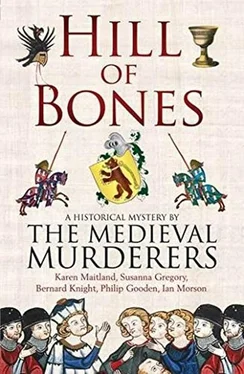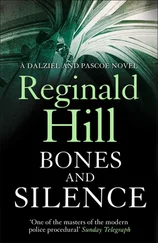‘I tell you again, Fortescue, until we get a radio-carbon dating on these, we can’t be sure. Why are you being so damned stubborn?’
The other man was sitting in a plastic picnic chair alongside the microscope. Peter Fortescue was middle-aged, short and stocky, still wearing his peaked baseball cap on his totally bald head. He had a pugnacious face, like a bad-tempered bull terrier, and was scowling at Roger Humbolt as he paraded past the exhibits.
One row of tables was devoted to a ragged collection of bones, some being roughly assembled into three human skeletons, though many of the brown or blackened parts were fragmentary, with some sections missing altogether. The trestles opposite had a motley assortment of objects, dominated by a dirty, but obviously valuable golden cup. Nearby was a large collection of tarnished silver coins, arranged carefully into piles of equal height. A small knife with an intricate handle, a part of an ancient mirror, several badly rusted buckles and part of a metal helmet sat amongst random coins, bits of iron, a few brass shot-gun cartridge bases and other detritus accumulated over more than a millennium.
Fortescue scowled at the other expert. ‘The police are not going to pay for your carbon dating, are they? Now that they know that none of this stuff is relevant to their investigation, they’re going to pull the plug on us.’
He was Director of Field Studies for the Southern Counties Archeology Trust, based in Dorchester, and had been retained as one of the boffins needed to evaluate what had been found during the police investigation. The carrot-haired man was a Senior Lecturer in Archeology at Wessex University, specialising in Dark Age Studies.
Apart from these two, there was also Dr Shirley Wagstaff, an assistant County Archeologist, whose main function had become acting as peacemaker between the other two, whose professional and personal animosity had increased with every day that passed.
Distinctive with her cropped grey hair and rugged, scrubbed face, as well as her man’s shirt and trousers, she stood now with a hand on the aluminium door, ready to go out for a respite from her tiresome colleagues.
‘Give it a rest, chaps!’ she snapped impatiently. ‘The police don’t give a damn about dating anything, now that the Home Office people have confirmed that nothing we’ve found is recent!’
Peter Fortescue agreed with her, as he glared at Humbolt with evil satisfaction.
‘If you want dating done, you’ll have to find the money yourself, Roger. Even the coroner says he’s not interested in any human remains more than a century old. He’s only concerned with holding a treasure-trove inquest on that gold and silver.’
Before they could embroil her again in their disputes, Shirley stepped smartly outside and with a nod to the constable, made her way over towards the police trailer, which had a tea and coffee machine, together with a supply of cold drinks and sandwiches. Inside the spartan vehicle, furnished with a few folding chairs and a spindly table, she found the two senior CID officers, one with a cardboard cup of what the machine claimed was coffee, the other with a can of Fanta. The archeologist had got on well with both men during their frequent visits to the site over past weeks and preferred their company to the two prima donnas she had left back in the tent.
Getting a Diet Coke for herself, she dropped into a spare chair alongside the table at which they were sitting.
‘Too damned hot for digging holes in the ground!’ she declared.
Bolitho nodded his agreement. ‘With a bit of luck, you won’t be doing much more. I suspect that we’ll call it off tomorrow.’
Bob Bryant asked her what would happen to all the excavations that had been made.
‘The county will have to fill them in and restore the whole place, or English Heritage will play hell with us, as it’s a Scheduled Site,’ she replied. ‘The hill has been explored several times before, going right back to Victorian times. There are records about what’s been found, mainly to do with this Iron Age camp.’
‘A wonder they didn’t turn up some of the stuff you’ve managed to unearth this time,’ said the superintendent.
Shirley Wagstaff shrugged. ‘A few trenches can miss most of the stuff. They didn’t have the fancy equipment we’ve got now – metal detectors, ground-penetrating radar and magnetometry gadgets.’
‘I reckon those two police dogs were better than the electronic gizmos,’ observed Bolitho, with a grin. ‘They found all the bones, which I suppose is what you’d expect a dog to do!’
Shirley agreed, but still defended her own technology. ‘Sure, but they were specially trained to sniff out human remains. The gadgets, as you call them, found the places where the soil had been disturbed or where there was metal under the ground.’
The DI was more interested in personalities than objects. ‘What’s the problem with your two colleagues?’ he asked. ‘They always seem to be slagging each other off!’
The woman rolled her eyes upwards in exasperation. ‘They’re like two kids fighting over a football! It all started a couple of years ago when Pete Fortescue wrote a review of a book Roger Humbolt had published about the Saxon invasions. He criticised parts of it and since then, they’ve been sworn enemies.’
‘What was the dispute about?’ asked John Bolitho.
‘Roger claims to be a leading expert on the Dark Ages, especially the Arthurian campaigns. He maintains that the great battle of Mount Badon, about 500 AD, was fought here on Solsbury. In fact, that’s why he was so keen to come on this dig: to a get a chance to find some confirmation. But Peter rubbished that, saying it must have been up near Swindon.’
‘God help us! To think that intelligent people can get so steamed up about things like that!’ said the DI, in disgust.
‘Having your professional reputation challenged is a fate worse than death to some academics,’ explained Shirley. ‘It can mean the loss of research grants and even affect their chances of promotion.’
The superintendent took the opportunity to ask the more sensible scientist some questions about what had been discovered during the past weeks.
‘I suppose you feel that all these items are just random finds, Doctor? There can be no connection between any of them?’
The archeologist considered this for a moment. ‘Always dangerous to be too dogmatic, so I suppose the best answer is that we’ll never know. We’ve got three skeletons and a lot of old bones, so who can say that one of those folk didn’t hide the gold cup there or bury that strange knife?’
‘Except that you can exclude the remains of that mummy!’ said Bryant. ‘The guy must have died centuries before he was brought to Britain, so he couldn’t have buried anything, including himself.’
‘What about that treasure?’ asked Bolitho. ‘It was all together in the side of the rampart wall. Any ideas about that?’
‘From the compact mass in which it was found, I suspect it was originally in some kind of bag, which has long rotted away. It’s odd, because the chalice is typically Saxon, the pyx is probably late eleventh century, yet the silver coins are Henry the Second, Richard the Lionheart and a couple of King John. So they must have been hidden in the early thirteenth century.’
‘Any idea where they may have come from?’
Shirley took a swig from her tin, then shrugged. ‘That communion cup is really valuable. Together with the pyx, it must have come from a rich ecclesiastical establishment. Of course, the nearest is Bath Abbey down there, but there’s no way of proving it.’
‘Are there no records that would help?’ asked Bolitho. ‘It must have been stolen, to end up in the ground here.’
Читать дальше












